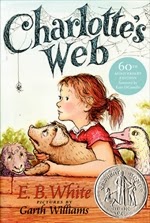Charlotte's Web isn't a children's book
I'm getting ready to start teaching an online course on writing about animals and Charlotte's Web is at the top of the reading list. It may seem strange to have a book we all remember from childhood on a reading list that is meant as an example of the complexity of our relations to animals. Also on the list: the work of Vicki Hearne, essays from The New Yorker, My Dog Tulip, etc., all works that are ambiguous or even somewhat unsettling. In other words, they are real.
But Charlotte's Web is real too, and a great example of how creative writing can take an idea, philosophy or problem and explore in an unexpected way. In notes to his publisher's marketing department E.B. White said that he wrote the book after moving to the country and finding an unexpected ethical dilemma with life on the farm: "A farm is a particular problem for a man who likes animals, because the fate of most livestock is that they are murdered by their benefactors."
I think our best writing comes from writing through things we don't yet understand. Certainly, my own memoirs about my relationship with dogs comes from a place of "not knowing" rather than a place of expertise. Part of the writing is solving the mystery of why this topic pulls at us so.
For more information on the upcoming class, check out Writing about Animals on Ruzuku.
But Charlotte's Web is real too, and a great example of how creative writing can take an idea, philosophy or problem and explore in an unexpected way. In notes to his publisher's marketing department E.B. White said that he wrote the book after moving to the country and finding an unexpected ethical dilemma with life on the farm: "A farm is a particular problem for a man who likes animals, because the fate of most livestock is that they are murdered by their benefactors."
I think our best writing comes from writing through things we don't yet understand. Certainly, my own memoirs about my relationship with dogs comes from a place of "not knowing" rather than a place of expertise. Part of the writing is solving the mystery of why this topic pulls at us so.
For more information on the upcoming class, check out Writing about Animals on Ruzuku.


Comments